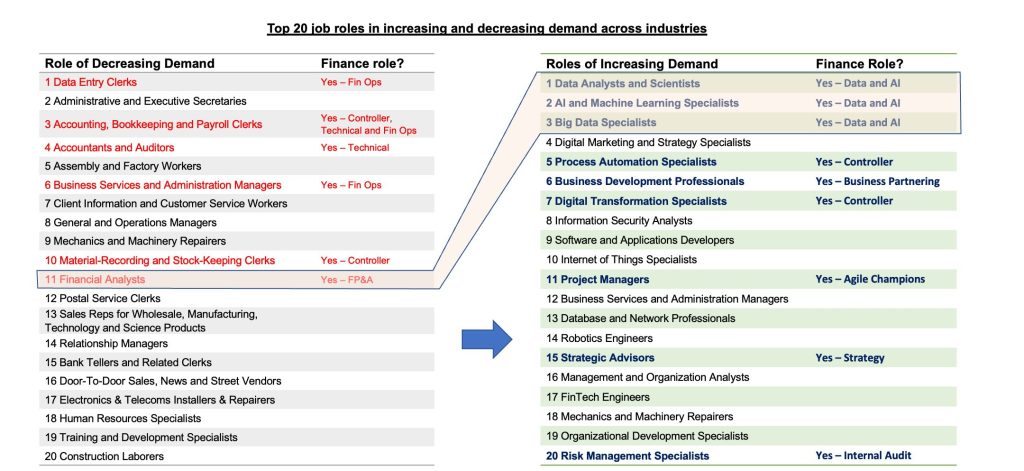Upskilling is an important part of any successful team. With finance jobs changing quicker than ever before, the world’s top finance leaders are looking to upskill their current teams to meet the demands of the future.
According to data from the World Economic Forum, 7 of the top 20 jobs that are going away in the next 10 years are in, or include roles within, the finance industry. This means that some of your team’s roles will be non-existent in a decade.

What’s more, innovations in data will pave the way for brand new roles in and around finance. Roles such as Digital Transformation Specialists, Data Analysts/Scientists, and Strategic Advisors.
That’s why I’m sharing my top 5 key skills to think about when training a finance team that is high performing now – and in years to come.
Data Science
There’s absolutely no denying that finance is evolving. The explosive growth of Big Data and AI will give finance professionals more information than ever to work with. But a wealth of information is worthless if you don’t know what to do with it!
Data Science skills are centred around making the most out of the data that you’ve got. With more complex, richer data, we need more complex skills and tools to dissect it. Excel is simply not going to be enough to deal with the extreme volume of data that will be available.
In order to get the most out of this rich data your team will first need to understand how and when Data Science can be used. This includes fraud prevention, customer insights, trading and risk management, to name a few. It is also extremely helpful for your team to be knowledgeable in big data programming languages such as Python, R and SQL.
If you’re looking for somewhere to start, this free ICAEW help-sheet is designed to help organisations and individuals plan out the skill developments needed to get ahead of the curve in finance.
Analytics and Visualisation
It’s all well and good having all this great data and recommendations, but if your team can’t share them with the business, your finance predictions will fall flat. That’s where analytics and data visualisation skills really come in. These skills help organisations to share their data and insights in clear, insightful visual reports.
There are a few key tools that can really boost your team’s data visualisation skills. These include business intelligence software such as Power BI and Tableau that can help your team to create interactive, data rich visualisations to share within your wider business. However, bear in mind that these applications are not magic. Users will still need training on how to use the tools, along with what type of visualisations to use for which projections.
Furthermore, training may be needed to get individuals to a point where they can work with a business to get their requests and requirements, and provide them with visual data that illustrates the information that they need.
Presenting and Influencing
So now your team has all this awesome data, and they’ve formatted it into a beautiful graph, now they just need to present it!
Presenting and influencing is a vastly underrated skill within finance circles. However, as the old adage goes, ‘it’s not what you know, it’s who you know’, and the same rings true in business influence. Contrary to what you might believe, the art of influencing in business is more about building good relationships with the right people across the business, rather than relying on the ‘gift of the gab’.
However, that’s not to say that good speaking skills are unnecessary. In order to influence business decisions, it helps to be able to effectively communicate what is happening, tell a good ‘story’, and to clearly present the information that you have at your disposal.
A great resource for building your influencing skills is Robert Cialdini’s book Influence: The Psychology of Persuasion.
Leadership and Management
Surprisingly, being a manager is (at least in my experience) the role in most finance teams that has the least training associated with it. However, it has by far the highest impact on people.
It’s a sad fact, but many of today’s finance managers are generally not great managers. This is because in finance, people are often promoted to management positions due to their technical strength and prowess. Unfortunately, there isn’t a correlation between being technically good, and being good with people, which means there is a massive need for management training and coaching.
The next key skill to focus on in your upskill plan is leadership. When I say this, I don’t just mean CFOs or Finance directors… leadership relates to everyone. In finance, change is coming at us so quickly that every single level of every organisation will require leaders who think ahead about how things are going to change, and take responsibility for leading their team through this change. Whether that’s new tools, new processes or new ways of working, there is a need for leaders everywhere.
If you find that your leaders need some guidance, my Finance Organisation Consulting services can help you to design a clear plan of action for your leaders and teams to help them succeed in the future of finance.
Personal Effectiveness
When thinking about personal effectiveness, I generally tend to focus on two things. The first is how productive and effective you are. And the second is how well you can maintain productivity and effectiveness while keeping a healthy balance of work and wellbeing.
In a world where we are moving away from tasks and processes, and more towards analysis and choices, you will have much more scope to think about questions such as “What am I doing today?”, “Where do I put my focus?”, “What are the things that I need to put most of my energy onto?”. To answer these questions every day, you need a good grasp on productivity, time management, and agile skills.
Alongside this, in order to avoid burnout in this post-COVID, remote-working world, you need to know how to maintain a healthy work-life balance and positive mental wellbeing.
There are lots of resources out there on how to prevent burnout in your team, but this one from limeade is a pretty great starting point.
Interested in Learning more?
If you would like to know more top finance skills, or how to upskill your team and prepare for the future of finance, get in touch today. After a 30-minute discovery call, I can help you to build a bespoke training programme that works for you and your team.


